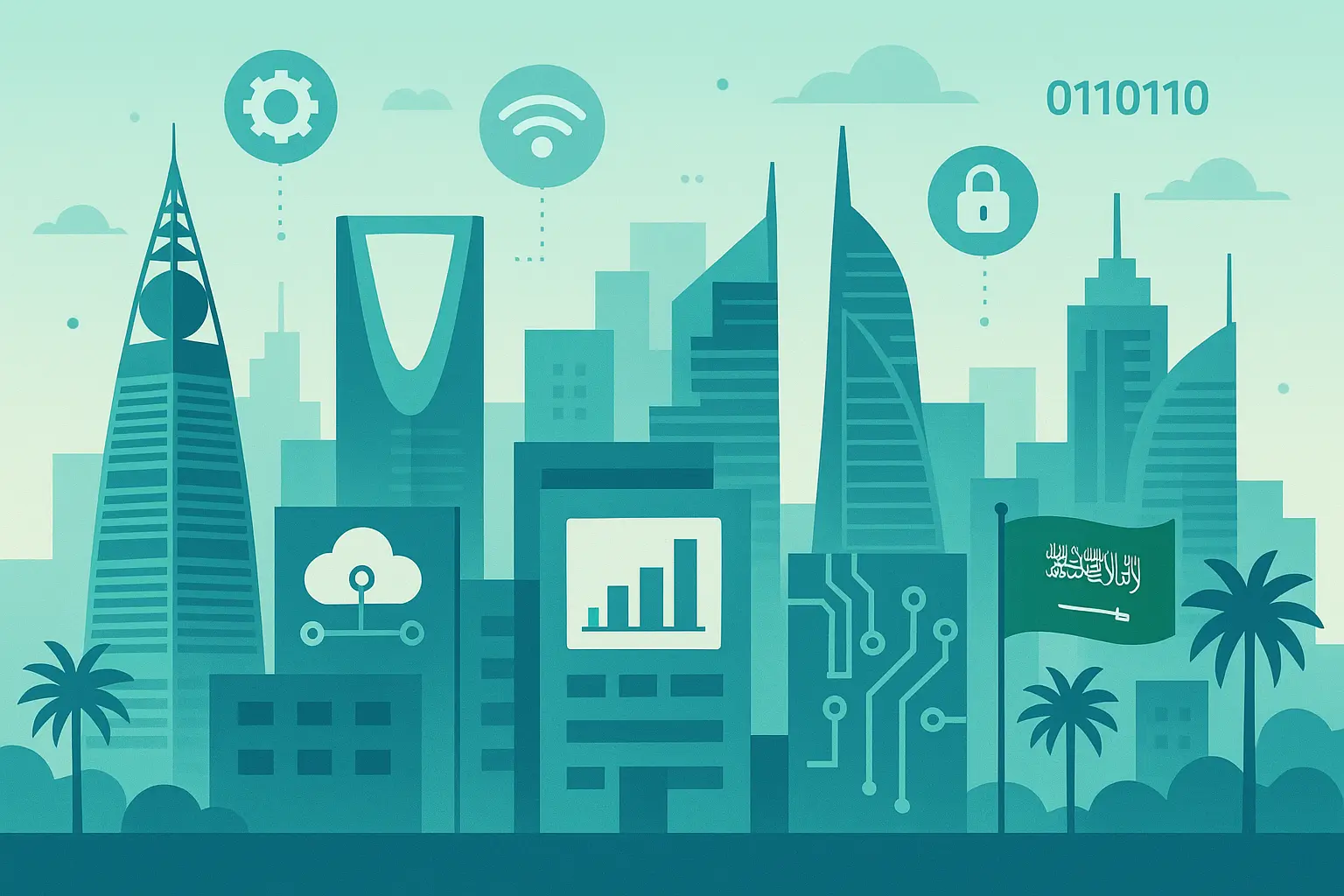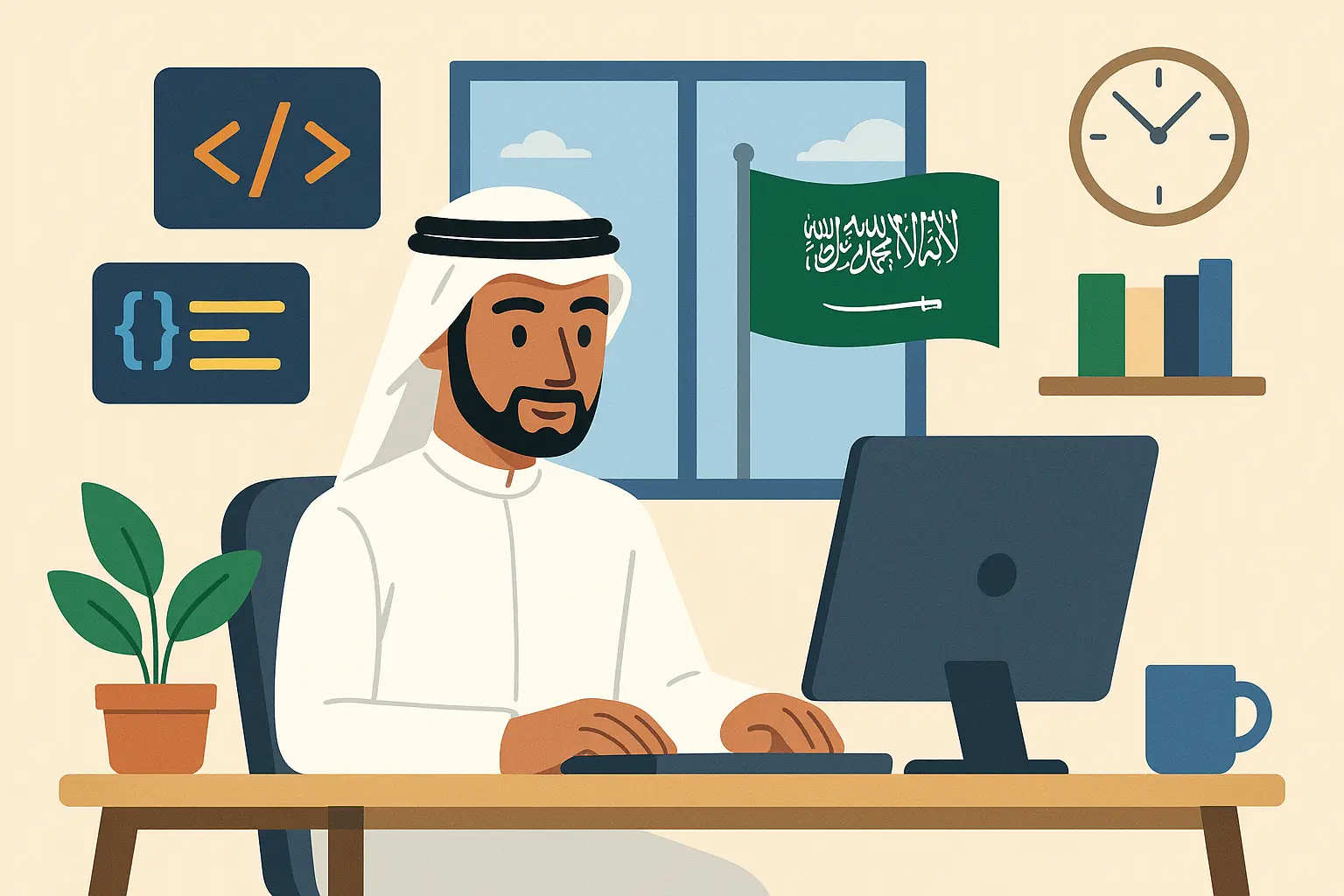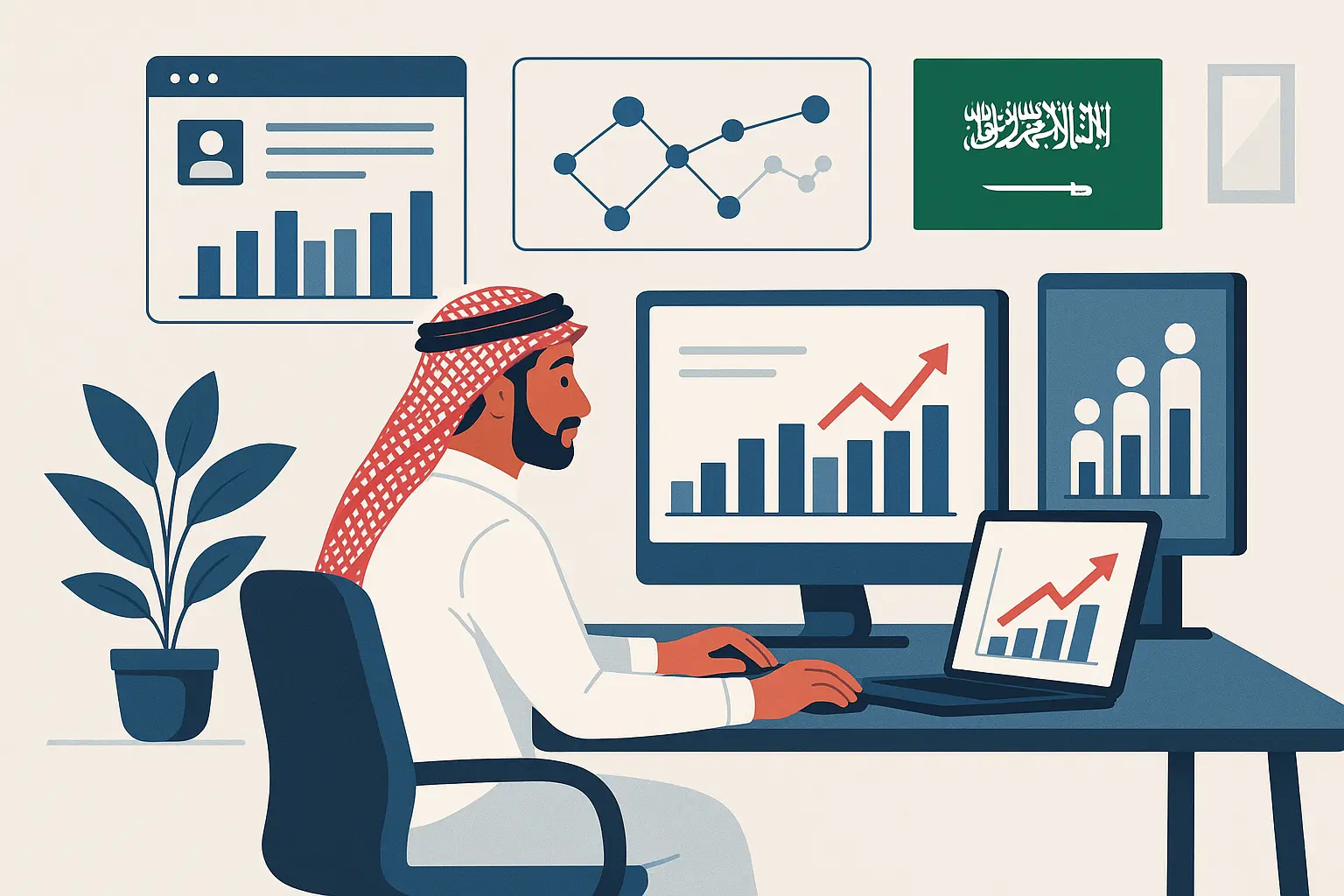Three years ago, I packed my bags and moved to Saudi Arabia to ride the tech wave everyone was talking about. What I found was way more complex than the salary surveys suggested.
Let me break down what developers actually make here – not just the sanitized numbers from job boards, but the real deal. According to recent data from levels.fyi, the average total compensation of a Software Engineer in Saudi Arabia is SAR 215,976, with ranges extending from SAR 120,020 to SAR 350,501 across different experience levels and companies. But that barely scratches the surface of what’s really happening in this market.

Table of Contents
-
The Real Story Behind Saudi Tech Salaries
-
What You’ll Actually Earn (By Experience Level)
-
The Skills That Actually Pay Premium
-
Company Types and What They Really Offer
-
Which Cities Actually Pay the Most
-
Smart Strategies to Maximize Your Earnings
-
The Documentation Reality Nobody Talks About
-
Bottom Line: Is It Worth It?
TL;DR
-
Fresh grads start at 8,000-15,000 SAR monthly, seniors can hit 35,000-70,000 SAR
-
Vision 2030 created a talent war – companies are desperate and paying accordingly
-
AI/ML and cybersecurity specialists earn 25-50% more than general developers
-
Your total package (housing, flights, benefits) can be 40% higher than base salary
-
Government roles = stability but lower pay; private sector = higher risk, higher reward
-
International companies bring global salary standards that boost the entire market
-
Having proper documentation ready can make or break opportunities
The Real Story Behind Saudi Tech Salaries
Here’s what nobody tells you: Vision 2030 didn’t just create jobs – it created a talent war.
I’ve watched fresh grads go from 8,000 SAR offers to 15,000 SAR in six months, simply because companies are desperate for anyone who can actually code. Meanwhile, my senior architect friend just negotiated 85,000 SAR monthly at Saudi Aramco. The range is wild.

Why Everything Changed After 2020
The government threw billions at tech projects. NEOM, smart cities, digital transformation – suddenly everyone needed developers yesterday. When you’re building a tech economy from scratch, you pay whatever it takes to get talent.
With “Vision 2030 creating 39,000 new tech jobs and adding $9.3 billion to the non-oil GDP by 2030” according to Nucamp, the scope of opportunity exploded overnight.
I’ve seen local companies double their salary offers overnight because they couldn’t compete with the international firms setting up shop in Riyadh. Microsoft’s $2.1 billion investment wasn’t just about cloud infrastructure – it reset salary expectations across the entire market.
The International Company Effect
When global tech giants establish regional headquarters in Riyadh and Jeddah, they don’t just bring higher salaries – they bring entirely different compensation philosophies. As “in 2024, the total number of mobile app developers has reached 30 million” globally according to Business of Apps, competition for skilled talent became fierce.
These companies apply global salary standards adjusted for local markets, creating upward pressure on compensation across the entire tech ecosystem. Local companies suddenly had to match these rates or lose their best people.
What You’ll Actually Earn (By Experience Level)
Let me give you the real numbers I’ve seen across my network:
Just Starting Out (0-1 years)
Reality check: 8,000-15,000 SAR monthly. Your portfolio matters more than your GPA, and having the right connections can bump you up 20-30%.
According to PayScale, “an entry-level Software Developer with less than 1 year experience can expect to earn an average total compensation of SAR 67,680 based on 15 salaries”, but I’ve seen fresh grads with strong portfolios start significantly higher.

Getting Your Feet Wet (1-3 years)
Sweet spot: 12,000-22,000 SAR monthly. This is where growth explodes if you’re on the right projects. I doubled my salary in 18 months by working on Vision 2030 initiatives.
Mid-Level Comfort Zone (3-7 years)
Solid range: 20,000-40,000 SAR monthly. You’re finally independent and can mentor others. Performance bonuses can add another 15-25% on top of your base.
Senior Level Money (7+ years)
Top tier: 35,000-70,000 SAR monthly. At this level, it’s about technical leadership, not just coding. Some architects I know are pulling 100,000+ SAR at major companies.
|
Experience Level |
Monthly Salary Range (SAR) |
Annual Total (SAR) |
What Really Matters |
|---|---|---|---|
|
Fresh Graduate (0-1 years) |
8,000 – 15,000 |
96,000 – 180,000 |
Portfolio beats GPA every time |
|
Junior Developer (1-3 years) |
12,000 – 22,000 |
144,000 – 264,000 |
Project impact drives rapid growth |
|
Mid-Level (3-7 years) |
20,000 – 40,000 |
240,000 – 480,000 |
Independence + mentoring ability |
|
Senior Developer (7+ years) |
35,000 – 70,000 |
420,000 – 840,000 |
Technical leadership trumps coding skills |
The Skills That Actually Pay Premium
Not all programming skills are created equal here. Some specializations can bump your salary 25-50% above the baseline:

AI/Machine Learning – Everyone Wants This
The government’s AI strategy means constant demand. According to Nucamp’s analysis, “AI/Machine Learning Engineers can expect yearly paychecks of SAR 300,000 – 400,000 ($80,000 – $106,600) in 2024”.
I know ML engineers making the top end of that range, especially those working on Arabic language processing and computer vision projects for smart city initiatives.
Cybersecurity – Gold Standard
With all the sensitive government projects, security experts are pure gold. A CISSP-certified friend of mine commands 55,000 SAR monthly working on Saudi Arabia’s national digital infrastructure. The premium reflects both the specialized skills and the critical nature of protecting national digital assets.
Arabic Language Processing – Your Secret Weapon
This is your secret weapon if you can do it. Most international developers can’t, so you can charge a premium. Companies working on government contracts especially value this skill.
Company Types and What They Really Offer
The type of organization you join fundamentally shapes both your salary and your life. Here’s what I’ve learned:

Government Roles: Stability vs. Money
Lower base pay but incredible job security and benefits. Work-life balance is real. Perfect if you want stability and don’t mind slower career progression.
Private Sector: Risk vs. Reward
Higher salaries but you’re at the mercy of market conditions. International companies pay the best but expect the most. This is where the real money is if you can handle the pressure.
Startups: High Risk, High Reward
Risky but potentially huge upside with equity. Most fail, but the ones that succeed can make you wealthy. Saudi Arabia’s growing startup ecosystem offers equity compensation that could provide significant long-term value.
|
Company Type |
Base Salary |
Benefits |
Career Growth |
Risk Level |
|---|---|---|---|---|
|
Government |
Medium |
Excellent job security |
Structured but slow |
Very Low |
|
Multinational Corp |
High |
Global opportunities, stock options |
Clear advancement paths |
Low |
|
Local Enterprise |
Medium-High |
Standard package |
Variable |
Medium |
|
Tech Startup |
Variable |
Equity potential |
High potential, uncertain timeline |
High |
Which Cities Actually Pay the Most
Let me break down the geographic reality – not all Saudi cities are created equal for tech salaries.
Riyadh is where the money is. Government contracts, international headquarters, and the highest cost of living. Expect 15-25% higher salaries than other cities.
Jeddah offers solid opportunities with a more relaxed vibe. Salaries are competitive but slightly lower than Riyadh. The trade-off? Better quality of life for many expats.
Dammam and the Eastern Province have oil company tech roles. Saudi Aramco and petrochemical companies pay well, but opportunities are more specialized.
NEOM and future cities – these are wild cards. Early employees often get premium packages, but you’re betting on projects that don’t fully exist yet.
Smart Strategies to Maximize Your Earnings
Success isn’t just about coding skills – it’s about understanding the market and positioning yourself strategically.

Before You Apply: Do Your Homework
Research specific companies, not just generic salary ranges. Develop skills the Saudi market specifically needs. Get your documentation sorted – this trips up so many people.
Understanding the long-term value of education is crucial, and many professionals question is it worth it to get a college degree when considering career advancement in tech fields.
Market Research Checklist:
-
☐ Compare salaries across Riyadh, Jeddah, and Dammam
-
☐ Research company-specific compensation philosophies
-
☐ Analyze job postings for required skills and benefits
-
☐ Network with current developers in target companies
-
☐ Consider cost of living differences between cities
During Negotiations: Cultural Awareness Matters
Saudi business culture values relationships over aggressive tactics. Focus on total compensation, not just base salary. Be patient – rushing never works here.
The Money Isn’t Just Salary
Here’s where most people mess up – they only look at base salary. Your real compensation includes:
-
Housing allowance (25-40% of base salary)
-
Annual flights home
-
Health insurance that actually works
-
Professional development budgets
-
Sometimes stock options if you’re at the right company
I calculated my total package, and it’s about 40% higher than my base salary when you factor everything in.

The Documentation Reality Nobody Talks About
This is boring but crucial: Saudi Arabia’s visa and employment process requires extensive documentation. I’ve watched talented developers miss out on great opportunities because they didn’t have their educational credentials properly certified.
The Saudi tech job market’s rapid growth has created intense competition among employers for qualified developers, making proper credential presentation crucial for maximizing salary offers. Educational verification involves multiple government departments and can be complex and time-consuming.

Having readily available documentation can accelerate applications and demonstrate professionalism to potential employers. When you’re competing for high-paying positions in Saudi Arabia’s fast-moving tech sector, being prepared for unexpected opportunities can make the difference between landing your dream role and missing out.
Many international professionals discover they need reliable documentation services, and understanding how to get a diploma replacement can save valuable time when pursuing high-paying tech positions in competitive markets.
ValidGrad’s diploma replacement services help developers maintain pristine original credentials while providing professional documentation for routine submissions. Their quick turnaround times and professional presentation ensure you’re always ready when premium opportunities arise.
Documentation Preparation Checklist:
-
☐ Obtain multiple certified copies of your degree
-
☐ Get transcripts translated and notarized
-
☐ Prepare professional portfolio with project examples
-
☐ Gather recommendation letters from previous employers
-
☐ Ensure passport and visa documents are current
-
☐ Create digital copies of all certifications
Learn more about ValidGrad’s credential services to streamline your Saudi tech career documentation needs.

For professionals who need to understand the broader context of educational credentials, learning about academic transcript requirements can help ensure all documentation meets international standards.
For developers looking to enhance their credentials, understanding software developer education requirements can help identify skill gaps and certification opportunities in the Saudi market.
Bottom Line: Is It Worth It?
Saudi Arabia’s tech market is real, the money is good, and the opportunities are growing. But success isn’t just about coding skills – it’s about understanding the market, respecting the culture, and positioning yourself strategically.
The developers making serious money here are the ones who saw this transformation coming and positioned themselves accordingly. Whether you’re just starting out or you’re a seasoned pro, there’s money to be made if you approach it right.
The sweet spot for financial comfort? Around 25,000 SAR monthly for a decent lifestyle, 35,000+ SAR if you want to save significantly and live well.
Zero income tax is real and significant. A 50,000 SAR salary in Saudi Arabia is equivalent to roughly 65,000-70,000 SAR in a country with income tax. The savings potential is high if you manage expenses well – many developers save 40-60% of their gross income.
Future outlook: Based on what I’m seeing on the ground, salaries will continue rising through 2025-2026 as Vision 2030 projects ramp up, then likely stabilize. The window for maximum earning potential is probably the next 3-5 years.
Specialization premiums will increase. Generalist developers will face more competition while specialists command higher premiums. Remote work will become more accepted, potentially reducing the need for expensive expat packages.
Red flags to watch for:
-
Companies that won’t discuss total compensation upfront
-
Unrealistic project timelines driven by Vision 2030 pressure
-
Unclear visa sponsorship processes
-
No clear growth path in a rapidly changing market
The women in tech reality: Female developers often face unique challenges but also unique opportunities. Saudi Arabia is actively promoting women in tech as part of Vision 2030. Salary parity is generally better in tech than other industries, especially at international companies, and remote work options are more common.
Networking matters: The Saudi tech community is smaller than you think, and reputation spreads fast. Building genuine relationships opens doors that applications alone won’t. Basic Arabic conversational skills aren’t required but can boost your career prospects and salary negotiations.
The market’s still evolving fast, which means more opportunities are coming. Get your skills right, your documents ready, and your expectations realistic – then go get paid.
Local talent development will eventually reduce demand for international developers, but that’s still 5-10 years away. For now, if you can navigate the cultural landscape, handle the documentation requirements, and position yourself in high-demand specializations, Saudi Arabia offers some of the most lucrative opportunities for developers in the Middle East.
The transformation is real, the money is there, and the timing is right. Just make sure you understand what you’re getting into beyond the salary numbers.
